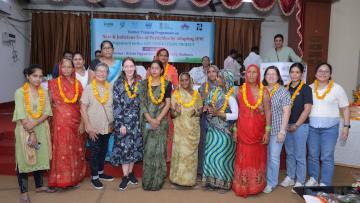
New Delhi, 16 August 2024 – The United Nations Industrial Development Organization (UNIDO) and partners have launched an ambitious new USD 7m regional project between India and the Philippines to support eco-friendly agriculture.
As part of the Global Environment Facility (GEF)-funded Financing Agrochemical Reduction and Management (FARM) Programme, the project seeks to promote eco-friendly crop solutions to reduce harmful persistent organic pollutants (POPs) and highly hazardous pesticides (HHPs) in Asia.
Representatives from the Philippines and the Indian national lead agency, HIL (India) Limited met with stakeholders in New Delhi, India last month to exchange on national experiences with bio pesticides and organic/natural farming.
The project launch also provided an opportunity for the lead ministries of Chemicals and Fertilizers (India) and Department of Agriculture (Philippines) to deliver keynote addresses and to formalize partnerships under the project. Five Memorandums of Understanding (MoUs) were signed between HIL (India) Limited and partners, including the National Horticultural Research and Development Foundation, the Coffee Board of India, and the Vivekananda Institute of Biotechnology.
The launch event was followed by the project’s first Farmers Training Programme on the safe and judicious use of alternative pesticides. This training event was attended by around 300 agricultural workers, signaling the farming community’s keen interest in taking up safer bio pesticides, such as neem and Bt based bio pesticides as alternatives to toxic chemical pesticides containing POPs and HHPs.
India’s Women Farmer Producer Organization also presented a range of organic products at the event, including organic lentil, coriander, turmeric, brown sugar, spices, tea masala, and Kashmiri red chilli.
FARM is a USD 379m, five-year initiative to combat agrochemical pollution led by the United Nations Environment Programme (UNEP), with the support of the United Nations Development Programme (UNDP), UNIDO, and the African Development Bank (AfDB) in a range of countries.
The programme has a particular focus on leveraging finance from public resources and the financial sector, and aims to align policy, enforcement, and finance towards the environmentally sustainable management of pesticides and agricultural plastics.
“Collaboration and strong partnership will be key to ensuring effective implementation,” explains Maren Mellendorf, UNIDO project manager. “This meeting provided an opportunity for us to build the foundation for the FARM regional network and to kick off our training activities under the project.”
India’s agriculture sector has been steadily growing over the last few decades; over half of its population relies on the agricultural sector for their livelihoods and the country is one of the largest producers of key staples and cash crops, such as spices, wheat, rice and tea. In the Philippines, as of 2019, there were over 9.7m agricultural workers yet only a little over 80 registered organic farms and companies.
This project will seek to establish sustainable financing, investment, and incentive mechanisms for eco-friendly crop protection solutions, with a focus on policy and enforcement, finance and investment, and value chains and public demand. Activities will range from harmonizing legislative and policy frameworks on bio pesticides between the two countries, to establishing demonstration sites and providing on-field training, as in Mathura and Agra last month.

For further information, please contact:
Maren Mellendorf, UNIDO Industrial Development Officer, m.mellendorf [at] unido.org (m[dot]mellendorf[at]unido[dot]org)
This article was originally published on UNIDO.
About FARM
The Financing Agrochemical Reduction and Management Programme (FARM) is a $379 million, five-year initiative to combat agrochemical pollution. Funded by the Global Environment Facility, the programme is led by UNEP, with the support of United Nations Development Programme, United Nations Industrial Development Organization and the African Development Bank. Participating countries include Ecuador, India, Kenya, Laos, Philippines, Uruguay, and Vietnam.
